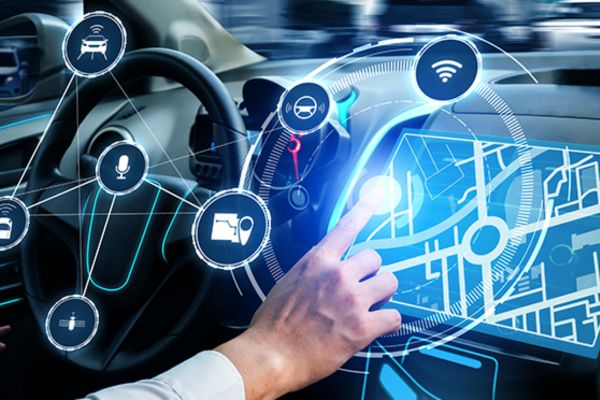The global automotive AI market was valued at USD 4.53 billion in 2024 and is projected to grow significantly, reaching approximately USD 44.76 billion by 2034, at a compound annual growth rate (CAGR) of 25.74% during the forecast period from 2025 to 2034.
This market is evolving rapidly, fueled by the rising demand for automation, enhanced safety, and the integration of smart technologies into modern vehicles. Industry leaders—including automotive manufacturers, technology companies, and startups—are heavily investing in AI to transform the driving experience. AI is not only pivotal in the development of autonomous vehicles but also in enhancing traditional systems such as Advanced Driver Assistance Systems (ADAS) and vehicle diagnostics.
AI applications are also expanding into predictive maintenance, using sensor and diagnostic data to minimize downtime and prevent costly repairs. Moreover, the growing adoption of electric vehicles (EVs)—which rely heavily on software and AI-driven systems—is further driving the need for advanced AI capabilities. Globally, tightening vehicle safety regulations are pushing manufacturers to adopt AI-powered safety technologies at a faster pace.
What Is Automotive AI?
Automotive Artificial Intelligence (AI) refers to the application of AI technologies in vehicles to improve safety, performance, and the overall driving experience. Key applications include:
- Autonomous Driving Systems: Enabling vehicles to operate without human input.
- ADAS (Advanced Driver Assistance Systems): Supporting functions such as lane-keeping, automated parking, and collision avoidance.
- Infotainment & Personalization: Offering smart in-car experiences tailored to driver preferences.
These systems leverage machine learning, deep learning, and computer vision to process data in real-time, enabling smarter, safer, and more efficient transportation.
Why Automotive AI Market
The Automotive AI (Artificial Intelligence) market is gaining momentum due to a convergence of technological, economic, and consumer trends transforming the automotive industry. Here are the main reasons why the Automotive AI market is growing and increasingly important:
1. Demand for Autonomous Driving
- AI is the backbone of self-driving technology, enabling vehicles to perceive surroundings, make decisions, and navigate complex environments.
- Companies like Tesla, Waymo, and NVIDIA are investing heavily in AI to push toward full autonomy (Level 4 and 5).
2. Enhanced Safety Features
- AI enables Advanced Driver Assistance Systems (ADAS) such as:
- Lane keeping assist
- Collision avoidance
- Adaptive cruise control
- These systems reduce human error and improve road safety, aligning with global regulations promoting safer vehicles.
3. Connectivity and Smart Features
- AI powers in-vehicle infotainment, voice recognition, and driver behavior monitoring.
- Cars are becoming more like “smartphones on wheels,” integrating with digital ecosystems and cloud platforms.
4. Predictive Maintenance & Fleet Management
- AI algorithms analyze sensor data to predict vehicle failures before they happen.
- This improves uptime and reduces maintenance costs for individual owners and fleet operators.
5. Cost Optimization in Manufacturing
- AI is used in automotive manufacturing and supply chain optimization, including:
- Predictive quality control
- Process automation
- Robotics and logistics
- This leads to greater production efficiency and cost savings.
6. Personalized Customer Experience
- AI helps automakers offer customized vehicle settings, targeted marketing, and smart recommendations for servicing or upgrades.
- This enhances brand loyalty and user satisfaction.
7. Support for EV Development
- AI aids in battery management systems, energy efficiency optimization, and intelligent charging infrastructure for electric vehicles.
- It’s crucial in managing the complexity of EV systems compared to traditional internal combustion engines.
8. Regulatory Push and Investments
- Governments are promoting AI-driven automotive innovations via:
- Grants and funding
- Safety and emission regulations that AI helps meet
- Venture capital and corporate investments in mobility startups are further driving growth.
Key Market Highlights (2024)
- North America led the global market with a 39.1% revenue share.
- Europe followed with a 28.3% share.
- By level of autonomy, Level 2 autonomy accounted for the largest share at 62%.
- By vehicle type, passenger vehicles dominated with 85.7% of the market.
- By component, the hardware segment held the largest share at 76.4%.
- By technology, machine learning led with a 38% revenue share.
Regional Market Analysis
North America – Market Leader
- 2024 Market Size: USD 1.77 billion
- 2034 Forecast: USD 17.5 billion
North America dominates the automotive AI market, driven by early adoption of autonomous driving technologies and ADAS. Strong investments in AI R&D by leading tech firms and automakers, along with favorable regulatory conditions for autonomous vehicle testing, have created a robust ecosystem. Strategic partnerships and acquisitions are fueling innovation and integration of AI solutions across vehicle platforms.
Europe – Focus on Sustainability & Safety
- 2024 Market Size: USD 1.28 billion
- 2034 Forecast: USD 12.67 billion
Europe emphasizes vehicle connectivity, safety, and environmental sustainability. AI adoption supports connected vehicle technologies, including vehicle-to-everything (V2X) communication and cybersecurity. Stringent emissions regulations encourage AI implementation in EVs to improve energy efficiency. Collaborations between OEMs and AI startups are driving innovation in line with Europe’s regulatory and environmental goals.
Asia-Pacific – Rapid Growth Region
- 2024 Market Size: USD 1.06 billion
- 2034 Forecast: USD 10.47 billion
Asia-Pacific is witnessing fast-paced growth, led by urban mobility initiatives, smart cities, and the increasing adoption of electric and shared vehicles. AI technologies are being used to address traffic congestion and pollution, with government support for integrating AI into infrastructure. Emerging economies offer significant opportunities for cost-effective, AI-driven mobility solutions.
LAMEA – Emerging AI Applications
LAMEA (Latin America, Middle East, and Africa) is focusing on enhancing vehicle connectivity and safety through AI. Regional investments aim to modernize transport infrastructure using AI-driven technologies. There’s growing interest in AI-powered electric and hybrid vehicles, supported by government incentives and rising environmental consciousness. Localized innovation is playing a key role in adapting AI solutions to regional transportation needs and consumer preferences.
Get Sample PDF of Report@ https://www.cervicornconsulting.com/sample/2327
















